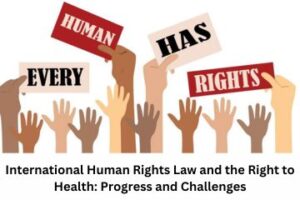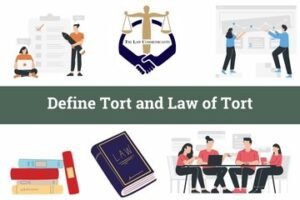Professional Misconduct By Advocates In India
Written By: Meghna Prust
Introduction
Advocacy is a noble profession, and an advocate is the most accountable, privileged, and educated member of society, and his actions serve as role models for society, which must be monitored. Professional misconduct is behavior that is outside the parameters of what the governing body of a profession considers appropriate or worthy of membership. Disgraceful or dishonorable conduct unbecoming of an advocate is referred to as professional misconduct. Advocates’ behavior is covered in Chapter V of the Advocate Act of 1961. It explains the regulations that govern the punishment of professional and other wrongdoing.
Section 35(1) of the Advocate Act of 1961 states that if a State Bar Council receives a complaint or otherwise has grounds to believe that any advocate on its roll has engaged in professional or other misconduct, it shall refer the case to its disciplinary committee for resolution. In general, the legal profession is not a trade or a business; rather, it is a gracious, dignified, and uncontaminated society vocation. Members in this profession should not encourage deception or corruption, but rather work to ensure that their clients receive justice. The way individuals of the profession conduct themselves determines the profession’s credibility and reputation. It’s a representation of a positive relationship between the Bar and the Bench.
Misconduct
According to the Oxford dictionary, misconduct is defined as “wrongful, inappropriate, or unlawful action driven by premeditation.” It is conduct that does not conform to established standards or laws, as well as dishonest or poor management, particularly by those entrusted or engaged to act on behalf of others. In its most basic definition, the term “professional misconduct” refers to unethical behavior. Misconduct in the legal profession is defined as an act committed with the aim to harm others by members of the profession. It refers to any action or behavior taken by an attorney in breach of professional ethics for personal gain. Professional misconduct occurs when an act causes disrespect for his profession and renders him unfit to practice it. In other words, conduct that disqualifies an advocate from practicing law.
The context of the function and obligation of an advocate should be kept in mind while understanding the breadth and implications of the term misconduct.’ Misconduct is a broad term that does not always entail the presence of moral turpitude. “Any breach of some established and clear rule of action, a forbidden act, unlawful or improper activity, willful in character, a dereliction of duty,” according to the Black’s Law Dictionary. In a different context, the Supreme Court has ruled that the phrase “misconduct” has no exact definition and must be interpreted in light of the subject matter and context in which it appears.
Any conduct that renders an advocate unfit for the practice of law, or is likely to obstruct or embarrass the administration of justice, may be considered misconduct and disciplinary action may be taken.
Misconduct is broad enough to encompass both misfeasance and malfeasance, and it is applied to professionals; it includes unprofessional acts even if they are not fundamentally incorrect. Any activity that seeks to bring discredit to the legal profession or detach the favorable opinion that the public should have about it is considered professional misconduct. The Supreme Court held in the case of State of Punjab v Ram Singh that the term misconduct can include moral turpitude, but that it must be improper or wrong behavior, unlawful behavior, willful in character, a forbidden act, a transgression of an established and definite rule of action or code of conduct, and not simply an error of judgment, carelessness, or negligence in the performance of duty.
Judgments
Sambhu Ram Yadav v. Hanuman Das Khatry (1)
The Supreme Court looked at the meaning and scope of “professional misconduct” in Section 35 of the Advocates Act. An advocate (posing as a litigant in the capacity of the respondent, not as an advocate in a rent control procedure) assaulted and kicked the complainant and asked him to drop the matter. The fundamental question, in this case, was whether the advocate’s actions constituted misconduct for which the Bar Council might take action, despite the fact that he was not working in the capacity of an advocate. The Supreme Court affirmed the rule that a lawyer must follow the accepted standards of conduct that make him worthy of the public’s trust as a court officer.
Consequently, his behavior was inappropriate for an advocate, even though he was not operating in his position as an advocate, and the Bar Council was justified in initiating disciplinary proceedings against him.
N.G. Dastane v. Shrikant S. Shind (2)
The Supreme Court ruled that seeking adjournments to postpone the examination of witnesses who were present without making other arrangements for examining such witnesses is a dereliction of duty owed to the Court and constitutes misconduct.
D.S Dalal v. State Bank of India (3)
A complaint was filed against an advocate, alleging that he misused funds intended for the filing of a lawsuit and professional costs. The attorney claimed that the High Court Registry had misplaced the litigation papers. The suit papers were officially returned to the advocate for the purpose of removing objections, but the advocate did not refile the suit for a long period. He was found guilty of misappropriating money paid to him by his client by the Disciplinary Committee, and as a result, he was disciplined for professional misconduct.
Emperor v. K.C.B A Pleader (4)
In this case, municipal authorities seized tins of ghee that were found to be contaminated and stored in the custody of a Marwari. The counsel misled the Marwari by claiming that the Sub-Divisional Office had ordered the tins to be returned to their rightful owner.
The lawyer was found to be ineligible.
Conclusion
Advocacy, unlike any other career, is viewed as a noble vocation, and professional ethics must be preserved, as evidenced by the examination of numerous cases and certain facts and situations. Various incidents of professional misconduct have been heard in court, including one in which an advocate attempted to murder his client. As a result, relevant authorities must intervene to ensure that people with criminal records are kept out of this field. Even while there are standards dealing with the social history of the person enrolling in this profession, such as the person enrolling must be free of any criminal charges, this does not mean the individual has a criminal nature.
As a result, the Bar Council can enact certain rules and regulations to ensure that the conduct of someone who is engaging in criminal behavior is governed by stringent limits, guaranteeing that the individual does not continue to behave unlawfully against his profession. The Bar Council should conduct various career guidance and development programs immediately after enrolment so that new legal professionals are informed of the do’s and don’ts of the profession and that the next generation of advocates is better.
Citation
(1) AIR 2001 SC 2509
(2) [2001] Insc 279 (5 May 2001)
(3) AIR 1993 SC 1608
(4) AIR 1935 Cal. 547
References
- http://www.legalservicesindia.com/article/1665/Professional-misconduct-of-lawyers-in-india.html
- https://blog.ipleaders.in/professional-misconduct-advocates-act-1961/?amp=1
- https://indiankanoon.org/doc/1460739/
- https://www.latestlaws.com/amp/articles/professional-misconduct-by-advocates-in-india-a-critical-analysis-by-trishala-singh
- https://www.klelawcollege.org/blog/misconduct-of-lawyers-in-india-a-few-case-examples/
- https://www.lawinsider.com/dictionary/professional-misconduct

Meghna Prusty
Student at The Law College, Utkal University
Previous Posts
Legal protection of rights and dignities of elders in India
A Study of Preventive Mechanisms in the Realm of Marine Pollution: Oil Spillage




